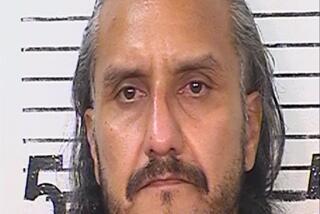2 Immigrants Face Trial in Friend’s Death
Seeking a better life, three men fled Guatemala and illegally migrated to Simi Valley, authorities say.
In a house on Sitka Avenue they met a fellow emigre who rented them a place to sleep in a one-story house with about 17 other Guatemalans.
There she put them to work recycling tires.
And there on July 19, after a night of boozing and brawling, Ventura County prosecutors say, one of them died at the hands of the other two.
Oscar Garnica-Vargas and Julio Arriaza, both 27, go on trial at 10 a.m. Monday in Ventura County Superior Court. Each faces a charge of murder in the stabbing death of Ezequiel Paz Romero, 37, during a fight. Garnica-Vargas is also charged with possessing a deadly weapon.
Arriaza’s attorney said his client had no part in Romero’s death. “The D.A.’s alleging that Arriaza handed the knife to Garnica-Vargas,” said defense lawyer Willard P. Wiksell. “Our version is that Garnica-Vargas saw the knife hidden and picked it up.”
The lower-middle-class neighborhood around the house is quiet, safe and populated largely by Latino immigrants, Wiksell said.
Arriaza had lived there for about two years, having escaped the squalor of his home in Guatemala, a home that the lawyer said is an adobe hut with a mud floor. “If you had a chicken to eat, you wouldn’t get another chicken for at least a couple of weeks,” he said.
Romero and Garnica-Vargas moved in later. They and other Guatemalans shared space that a woman named Octavila Pineda rented to them in the stucco house.
The three rode around Ventura County in a beat-up van, scavenging old tires from gas stations, dumps and roadsides.
Pineda had bought a machine to cut grooves in bald tires, and she put the men to work at that job in the garage, said Deputy Public Defender Richard Holly, who is representing Garnica-Vargas.
“They would scratch a deeper tread” in the discards, he said. “They’d dip it in a paint type of a substance to make it all shiny and new. And then they’d sell them for $7.50 apiece. . . . Hopefully, they wouldn’t scratch it so deep that you’d see the wire.”
They didn’t earn much money at it, and money lay behind Romero’s death, said Deputy Dist. Atty. Donald C. Glynn.
On July 19 at about 11 p.m., Garnica-Vargas and Romero began squabbling about their earnings, Glynn said.
Wiksell said Romero was a bully who had a reputation for violence and often bragged about the guns that he owned and the people that he’d killed.
Romero, who stood 5-foot-10 and weighed 200 pounds, began trading blows with Garnica-Vargas, who at 5-foot-5 weighs 135 pounds, Wiksell said.
The fight wasn’t the first they’d had. When it started, Pineda’s daughter hid the steak knives, Wiksell said.
Romero and Garnica-Vargas tumbled outside and were “rolling around in the street, kicking and punching each other and scratching and biting” in front of about 15 other people, Wiksell said.
Arriaza pulled the men apart, and Romero walked away to wash his scrapes and bruises with a garden hose, Glynn said.
Then, Glynn said, Garnica-Vargas stabbed Romero to death.
The defense lawyer said it wasn’t a premeditated killing. The prosecutor said there is evidence that Arriaza handed the knife to Garnica-Vargas and said, “Go kill him now.”
Glynn said, “It’s not entirely clear” where the knife came from, but Garnica-Vargas “delivers one underhand blow to his stomach, and that’s it.”
Romero bled to death from a lanced abdominal artery. Arriaza and Garnica-Vargas were arrested later that night. They are being held on $1-million bail each.
More to Read
Sign up for Essential California
The most important California stories and recommendations in your inbox every morning.
You may occasionally receive promotional content from the Los Angeles Times.










